Premium Only Content
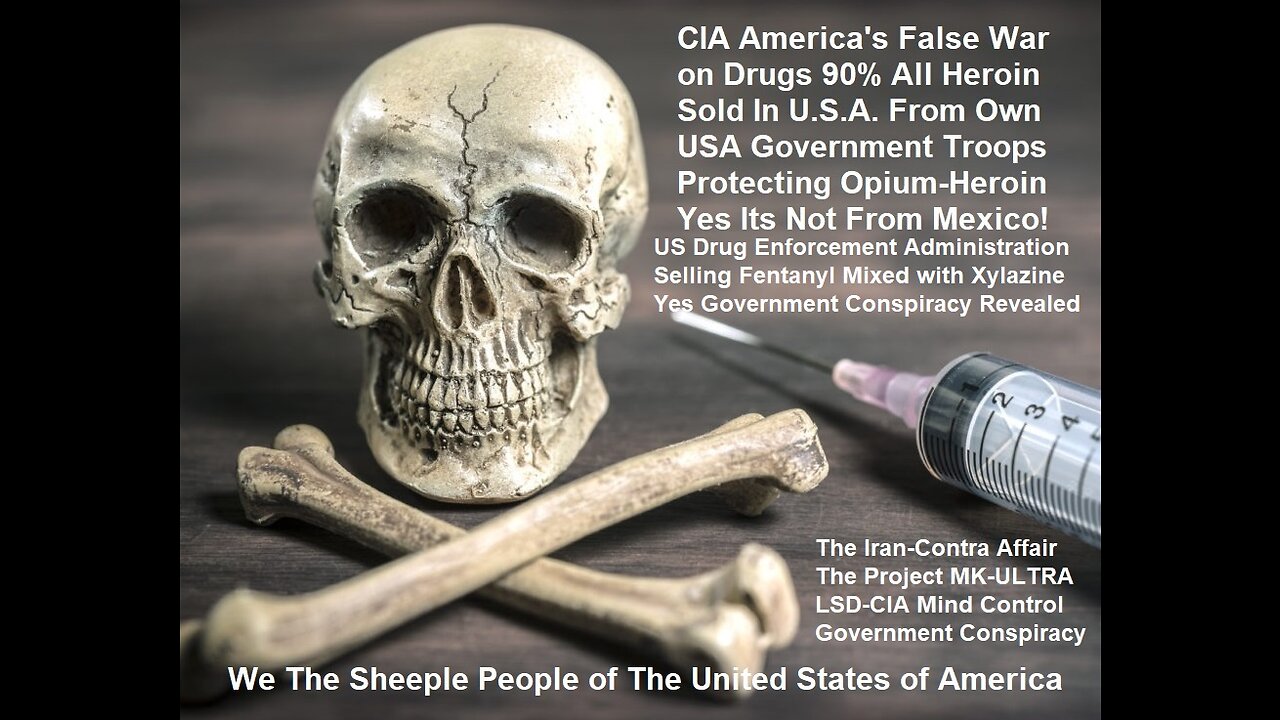
CIA Killing 100,000> Year Selling Heroin In U.S.A. Our Troops Protecting Opium-Heroin
In 1990, a failed CIA anti-drug operation in Venezuela resulted in at least 18 ton of cocaine being smuggled into the United States and sold on the streets. The incident, which was first made public in 1993, was part of a plan to assist an undercover agent to gain the confidence of a Colombian drug cartel. How the CIA Turned Us onto LSD and Heroin Secrets of America's False War on Drugs. Through in-depth interviews with academic researchers, historians, journalists, former federal agents, and drug dealers, America's Fake War on Drugs tells true tales of how, for instance, the CIA and Department of Defense helped to introduce LSD to Americans in the 1950s. "The CIA literally sent over two guys to Sandoz Laboratories where LSD had first been synthesized and bought up the world's supply of LSD and brought it back," Lappé tells Nick Gillespie in a wide-ranging conversation about the longest war the U.S. government has fought. "With that supply they began a [secret mind-control] program called MK Ultra which had all sorts of other drugs involved."
The cover the history of drug prohibition, the rise of the '60s drug counterculture; heroin epidemics past and present; how drug policy has warped U.S. foreign policy in Southeast Asia, Central America, Afghanistan, and beyond; the bipartisan politics of prohibition; and much more. America's Fake War on Drugs features exclusive and rarely seen footage and documents how, time and time again, the government was often facilitating trade and use in the very drugs it was trying to false stamp out. The new world order adds short videos, and more information in an attempt to produce an "immersive experience" that will change how viewers think and feel about prohibition.
Though is that knowledge and reason will eventually win out over keeping things in the dark, making things taboo." Even when it veers off into questionable territory (such as the role of the government in creating the crack epidemic of the 1980s), America's False War on Drugs performs the invaluable function of furthering a conversation about drug policies and attitudes that have caused far more harm than they have alleviated. We take a very critical look at the entire history of the war on drugs. In particular, looking at American foreign policy and how the Central Intelligence Agency is not just been involved in a couple of bad apples here and there. In couple rogue operations as a lot of these drug trafficking allegations have been called before.
But actually very directly involved in drug trafficking not only drug trafficking but in the largest drug trafficking stories of our time. Whether that's in the secret tests that introduced LSD to the United States or heroin during the late 60's and early 70's from southeast Asia, to cocaine during the late 70's and early 80's onto opium and heroin coming out of Afghanistan. There's a huge story to be told there about the actual extent of the US government's involvement in drug trafficking.
Gillespie: Let's talk first about the old days of MK Ultra and mind control and the way that the CIA actually helped introduce LSD evolved drugs into America, to American minds. What was going on in the 50's with the CIA and how did they become involved in introducing LSD to Americans?
Lappe: This is a story that a lot of your listeners may have heard about, people have heard about MK Ultra and I had as well, but I never really understood the full origins of the story. They go all the way back to the 1950's. During the 1950's of course, US and the Soviet Union are locked in a battle for hearts and minds around the world and psychoactive drugs were a big part of the Cold War psychological warfare programs on both sides.
The CIA had heard rumors that the Soviet Union was starting to use LSD at this point as a truth serum to see if they could break spies and get them to expose details, admit they were spies et cetera. The CIA literally sent over two guys to Sandoz Laboratories where LSD had first been synthesized and bought up the world's supply of LSD and brought it back. With that supply they began a program called MK Ultra which had all sorts of other drugs involved.
In particular they started doing secret tests around the country. Some of them using in veteran's hospitals and through the military. Others were in mental hospitals, a lot of basic, pretty much a lot of them were unwitting people, mental patients. But one of the incredible stories we found, I never knew this before, is that Ken Kesey, famously the author of One Flew Over the Cuckoo's Nest and really the guy who started the famous acid tests in the San Francisco Bay area, it was really the godfather of acid movement. As a Stanford grad student, or sorry an undergrad, was part of a test at the Menlo Park Veteran's hospital. Loved it so much that he got a job in the lab, stole all the acid, went up to San Francisco and started his acid test. That was the origins of how LSD was introduced into United States. This was also happening in other places around the country. It was just that Ken Kesey was the progenitor of the entire movement. It literally was the CIA.
Gillespie: That is a real challenge to all good thinking Libertarians like myself. Small L Libertarians who say that the government can never do anything right. The manage to strangely change the course, not of, I guess maybe of Cold War history, but certainly of American cultural history through their actions. The first episode of the series, and again check these out on history.com, the History Channel if you have, you can download their app and take a look at it. Plus there's other material there that's well worth delving into.
You look at the prehistory of Richard Nixon's declaration of a war on drugs in the early 70's, what were some of the motivating factors you found behind Nixon declaring war on drugs? Very early in the 70's he talked about, famously used the phrase, declaring a war on drugs, that illegals drugs were the number one enemy facing America. What was going on, things like pot and acid and heroin rose to that level of attention from the federal government?
Lappe: You really had two strains happening. You had the psychedelic movement which was heavily influenced by acid which the CIA itself had introduced, which is just my blowing right. Then you had pot as well which basically increasing numbers of young people were smoking. Nixon declares famously this war on drugs in June 1971. At the same time there was a massive heroin epidemic that really was ravaging mostly the eastern seaboard. What a lot people don't realize is that too in part, you could argue another case of blow back from our own operations.
During the mid 60's to late 60's there was a famous, everyone knows, a war against communist forces in Vietnam but also next door there was a gigantic secret war happening in Laos that officially we were not supposed to be fighting. Both politically it was radioactive for Johnson to declare another front but there were also treaties that said that we couldn't have troops on the ground both with Laos and we had an agreement, a sort of tacit agreement with the Soviet Union they wouldn't put troops on the ground.
There was a massive clandestine CIA operation in Laos running this secret war. People have probably heard of this CIA airline called Air America. Basically we go into business helping a local warlord named Vang Pao. When we started the war in the mid 60's, around 65, Vang Pao was a sort of somewhat populous, anti-communist leader of the Hmong hill people in Laos and was peripherally involved in growing opium because that's really what the cash crop was in that area.
By 1968, 1969 into 1970 Vang Pao was the biggest heroin trafficker on the planet. Some of his partners were the Sicilian mobsters that we had gone into business to put in Havana Cuba and south Florida to try to kill Fidel Castro. Basically we had created this huge network or aided this huge network of international drug trafficking that created a massive heroin epidemic which has only been surpassed by the current opioid crisis and we go into that later.
What happens is, there's all this heroin in the theater of war in southeast Asia, a lot of troops are getting hooked, famously they all start bringing this heroin back and heroin really starts devastating the inner city and there was a legitimate belief by a lot of people that really it was out of control and crime rates were really skyrocketing especially in cities like New York. So Nixon was under a lot of pressure. He had run in 1960 under the banner of law and order and the country was literally falling apart by 1971 in his eyes.
Gillespie: As you were saying, the crime really ratcheted up. It started in the 50's but it really ratcheted up in the 60's, there was the perception that people were leaving cities in droves to avoid crime. You talk, I think, in the first episode, it's something that in 1960 the government figures had something like 50,000 heroin addicts around the country or heroin users and it had crept up to something like 200,000 or 500,000 by about 1970.
Lappe: Yeah.
Gillespie: Part of it Nixon was a law and order guy and there's, you go into this a bit at your site as well as in the show that John Ehrlichman one of Richard Nixon's chief lieutenants in a 1990, 94 interview with Dan Baum who ultimately published a story in Harper's about this, that he said that the war on pot and the war on drugs was really a way to control black people. There was also this sense that the urban American was going to hell in a hand basket as well.
Follow up question for that is, the war on drugs gets birthed out of mixed feeling and Nixon and there's some footage in one of the episodes of Ronald Reagan denouncing the use of acid in the 60's and obviously became drug warrior himself as president. There was a strong bipartisan element to the war on drugs because even people, Jimmy Carter seemed to be okay with the idea of pot legalization or decriminalization until events overtook him and he became a staunch drug warrior. People like Bill Clinton, people like Barack Obama also added to the drug war. What is the, I guess that's a long wind up for a pretty simple question, what is it about the war on drugs that pulls such support from Democrats and Republicans across the board?
Lappe: I think this is pretty deep question because I think it goes to what I found in working on this project which is really one of the most epic projects I've ever worked on in my life in terms of the amount of research we did. I think drugs have always played a scapegoat role in our society where we see other social forces, in particular economic forces and other things that have been pressures on communities and it's very easy to point the finger at drugs. In some ways it's a natural reaction to try to crack down on them in the harshest way. Of course by cracking down on drugs are an inanimate object, there is no such thing as a crack down on drugs. You're cracking down on people. And when you crack down on people, that has a reverberating effect. It also can be used as a tool.
Nixon is probably one of the most cynical politicians in our history but maybe not the worst in my opinion. He saw it purely, in my opinion, as a political move. As a way to take out this, he believed he had all these enemies that were growing around him, all these social movements, you had black nationalism, you had increasingly radicalized hippie movement that had turned from a peacenik movement into a more dangerous, whether underground type of operations. There was a feeling that society was unraveling to some degree. That was in large part because it was because we lived in a oppressive racist society and there was a war that in 1968, everyone knew was at a stalemate or that we had lost but continued going on. People don't realize half the people died, of our soldiers after 1968 when Nixon ran under this completely cynical lie that he had a secret plan to end the war [Editor's note: Journalism historian Joseph W. Campbell has documented that Candidate Nixon never publicly made such a pledge, which continues to be cited frequently.].
There was all these other forces going on in drugs were very easy way to demonize people.
Gillespie: At the website, at history.com, among the various things you have in timelines or whatnot that are worth going back to. The early attempts to link cocaine with black people and if you want to crack down on cocaine because white women may be taking it or something, you crack down on black people. When pot became illegal, under federal law, became effectively illegal in the 1930's, it was identified with Mexicans. Chinese and opium was a problem. It is fascinating in the 60's you have with something like LSD the youth movement and hippies and then again when ecstasy which was made illegal in the 80's thanks in large part to Joe Biden.
The identification of a subculture or subgroup or a particular ethnic group that you can crack down on is one of the really haunting elements, I think, of the drug war and that comes through in this, in this series. Talk a bit about how particularly after 9/11 part of the series, and I think you're absolutely right in looking at it, that what this does in a way that is really fresh and interesting is look at how foreign policy, US foreign policy has been both guided and infected by the drug war. Talk a bit about the post 9/11 era and how have fears of narco-terrorism really changed the way we go about our foreign policy?
Lappe: Narco-terrorism is a term that started, that was introduced after 9/11, shortly after really. We show how in the first Superbowl after 9/11, the Partnership for Drug Free America began running this very eerie infamous ad now where you had a bunch of kids saying, "I supported terrorists, I supported a suicide bomber, I did this." Basically saying because I did drugs I was helping all of these different terrorists groups et cetera. When the incredible irony is that our own government has been knee deep in drug trafficking for decades.
There was a big push though it was completely ironic and what we show in our last episode which is the post 9/11 era, is we actually have an undercover DEA agent. This was a huge theme that we saw throughout our series was the tension between the DEA and the CIA. I'll paint the picture of what was happening in Afghanistan.
In the late 1990's, opium has always been one of or the biggest cash crop in Afghanistan. During the 1990's there was a massive civil war. All sides were using opium to finance themselves. The Taliban comes in to power and starts taxing at first, opium growers but by the late 90's the Taliban is having a huge PR problem. They're chopping off women's heads in stadiums and they're blowing up the Buddhas. They were becoming an international pariah. They pulled this incredible PR coup where they said they were cracking down on opium. When really all they were doing were stockpiling it. Basically they launched this whole fake crackdown that got the UN off their back. The US, we even in 2000, sent them $40 million of aid money to help, quote unquote, crackdown on opium. But really what was happening was they were stockpiling opium and then after 9/11 used those stockpiles to ramp up their war effort.
At the time of 9/11, Afghanistan was about 30% of the world's heroin. Today it's about 90%. What Afghanistan has become is a drug war. People never talk about it in that context but Afghanistan is a giant drug war. The Taliban have, to quote REM, lost their religion. They're really are not much of a religious force any more as they are just any other militant insurgency group that is trying to take down a government. There isn't much, they're not putting a lot of effort into their Sharia program. They basically have become gigantic drug traffickers. But also our allies in Afghanistan. Including in the early days, Hamid Karzai's brother, Wali Karzai was the biggest heroin trafficker and drug lord who controlled all the traffic in Kandahar. Who was completely protected by the CIA.
I talked to soldiers who literally their job was to guard the opium fields of our local warlord allies. This heroin has had a major impact on the world's drug stage. It should be noted a lot of the heroin that comes into the United States is coming from Mexico now but a lot of it is coming from Afghanistan, especially on the east coast and in Canada. It's a really incredible story that no one really talks about. There's a great reporter that is one of our contributors to the show named, Gretchen Peters, wrote a book called, Seeds of Terror. That essentially is her thesis.
We also have great stories about the undercover DEA agents who were fighting to try to take down drug traffickers at the same time the CIA was undermining their efforts.
Gillespie: It's a phenomenal drama that unfolds and it has these dark, rich, historical ironies that abound throughout the series. The odds are good now at least and actually in a story that's up at the website, you guys talk about Jeff Sessions, the Attorney General under Donald Trump. Who has really, he's pledged to really redouble efforts at least domestically, on the war on drugs which you guys point out at least in it's Nixonian phase has been going on for 50 years. It's really more like a 100 years when you go all the way back to things like the Harrison Narcotics Act.
It's failing, it doesn't seem to have much effect on drug usage rates, they seem to be independent of enforcement, there's obviously problems with surgeon opiod use that is it's own tangled web of unintended consequences and weird interventions into markets. At the same time the odds are phenomenal that pot is going to be fully legal in the US within the next decade if not before. During the campaign, weirdly Donald Trump seemed to be at times okay with the idea of different states deciding what kind of marijuana policies, obviously the Sessions factors a big difference from that. Are you optimistic that we're at least entering the beginning of the end of the drug war, to borrow a terrible Vietnam phrase that there's light at the end of the tunnel in terms of American attitudes towards currently illegal drugs, and rethinking the drug war?
Lappe: There's no doubt that things are moving in that direction in the same way there's no doubt that things like gay rights and LGBT rights are moving in a certain direction. Jeff Sessions essentially is a weird outlier, historical blip, as you said, to try to pin Trump down on any one ideology or stance is literally impossible. He said we were going to stop all our foreign wars, yet he's sending 8,000 more troops in Afghanistan. Whatever Trump has said on the war on drugs is sort of irrelevant.
But Sessions is just a weird dinosaur throwback to another era that I think is just going to be, if he survives the next three years. Will just be a blip in the road towards eventually people moving, starting with marijuana towards legalization both for, at least, nationwide to medicinal use if not most states towards recreational use. Because people are seeing that it doesn't really have any negative effects, there isn't really a gigantic increase in use and there's great benefits to society in terms of being able to tax it and make it a normalized thing. I think a big part of the problem with drugs and Dr. Carl Hart at Columbia is one of the most iconoclastic guys on this and he's in our series, he's out on the far fringes of this. But what he really says is, the problem with drugs is not drugs. The problem is drug use and misuse and people being idiots with drugs and not knowing how to use them.
Gillespie: But it's hard to know how to use them if you're not allowed to freely and openly discuss the facts, your experiences, your parents, we have enough problems with alcohol abuse and that's fully legal. When you start talking about these other drugs it's hard to get good information.
Lappe: Right. It's the same thing with these abstinence programs. You see wherever there's abstinence programs there's more STD's, there's more pregnancies because people are ignorant. I think that's a great trait of libertarianism even though I don't believe in everything you guys believe in. Is that knowledge and reason will eventually win out over keeping things in the dark, making things taboo. I think that people are rational and when it comes … There's always going to be people who are going to abuse something, just the same way people abuse alcohol or any substance. I think there is a general consensus that we're moving in a particular direction and I think that ultimately it's going to be better for society. Provisional data from CDC’s National Center for Health Statistics indicate that there were an estimated 100,306 drug overdose deaths in the United States during 12-month period ending in April 2021, an increase of 28.5% from the 78,056 deaths during the same period the year before.
The new data documents that estimated overdose deaths from opioids increased to 75,673 in the 12-month period ending in April 2021, up from 56,064 the year before. Overdose deaths from synthetic opioids (primarily fentanyl) and psychostimulants such as methamphetamine also increased in the 12-month period ending in April 2021. Cocaine deaths also increased, as did deaths from natural and semi-synthetic opioids (such as prescription pain medication).
The provisional data presented in this visualization include: the reported and predicted (estimated) provisional counts of deaths due to drug overdose occurring nationally and in each jurisdiction; a U.S. map of the percentage changes in provisional drug overdose deaths for the current 12-month ending period compared with the 12-month period ending in the same month of the previous year, by jurisdiction; and the reported and predicted provisional counts of drug overdose deaths involving specific drugs or drug classes occurring nationally and in selected jurisdictions.
The reported and predicted provisional counts represent the numbers of deaths due to drug overdose occurring in the 12-month periods ending in the month indicated. These counts include all seasons of the year and are insensitive to variations by seasonality. Deaths are reported by the jurisdiction in which the death occurred.
Drug overdoses now kill more than 100,000 Americans a year — more than vehicle crash and gun deaths combined. Our Own Government Sale Drugs To Kill US Overdose/Deaths.
Researchers think LSD flashbacks may happen during times of increased stress. Project MK-Ultra, the code name given to a Central Intelligence Agency program that began in the 1950s and lasted through the 1960s, is sometimes known as part of the CIA’s “mind control program and the Central Intelligence Agency Sold over 6 Millon+ Hit of Acid to the u.s.a. People in the 1950 thur 1973 These government acid experiments—which also sold millon's of hits or tabs of acid involved dozens of universities, pharmaceutical companies and medical facilities—took place throughout the 1950s and 1960s, before LSD was deemed too unpredictable to use in the field.
When Project MK-Ultra became public knowledge in the 1970s, the scandal resulted in numerous lawsuits and a congressional investigation headed by Senator Frank Church.
After volunteering to take part in Project MKUltra as a student at Stanford University, Ken Kesey, author of the 1962 novel One Flew Over the Cuckoo’s Nest, went on to promote the use of LSD.
In the early 1960s, Kesey and the Merry Pranksters (as his group of followers were called) hosted a series of LSD-fueled parties in the San Francisco Bay area. Kesey called these parties “Acid Tests.”
Acid Tests combined drug use with musical performances by bands including the Grateful Dead and psychedelic effects such as fluorescent paint and black lights.
Both psychology professors at Harvard University, Timothy Leary and Richard Alpert administered LSD and psychedelic mushrooms to Harvard students during a series of experiments in the early 1960s.
At the time, neither of these substances (Gov. Sales of over 6 Millon hits of acid) were illegal in the United States. (The U.S. federal government didn’t outlaw LSD until 1968.)
Leary and Alpert documented the effects of the hallucinogenic drugs on the students’ consciousness. The scientific community, however, criticized the legitimacy of the studies which Leary and Alpert conducted while also tripping.
Both men were eventually dismissed from Harvard but went on to become symbols of the psychedelic drug and hippie counterculture.
Paraquat Pot: The True Story Of How The US Government Tried To Kill Weed Smokers With A Toxic Chemical In The 1980s
When people talk about “killer weed,” that’s typically understood to mean really good weed. But due to US government policies that started in the 1970s and extended through most of the 1980s, marijuana fields were being sprayed with a chemical that can actually kill you. The chemical, known as “paraquat,” is an herbicide sprayed over marijuana fields in Mexico in the 1970s—with the aid of US money and US-provided helicopters—and over marijuana fields in Georgia in the 1980s under the direction of the Reagan Administration.
But normally, anything poisonous enough to kill plants is also toxic enough to kill humans, and that is the case with paraquat.
Our Own Government with Oliver North Worked With Cocaine Traffickers to Arm Terrorists Along with a Other U.S.A. leading role in the Iran/Contra scandal - in which North helped sell arms to Iran to fund the Contra War - North is also said to have employed air and sea transport companies moonlighting as drugs carriers.
A series of expose articles in the San Jose told tales of a drug triangle during the 1980s that linked CIA officials in Central America, the U.S.A. Gov. Own Air Forces fly tons of drugs in and fly guns and arms out to Central America and Sold Tons of Drugs to a San Francisco drug ring and a Los Angeles drug dealer. According to the stories, the CIA and its operatives used crack cocaine--sold via the Los Angeles African-American community--to raise 100s millions dollars to support the agency's clandestine operations in Central America.
Now its very funny again the CIA/FBI Our Government is Sell Drugs Again. The U.S. drug epidemic reached another terrible milestone Wednesday when the government announced that more than 100,000 people had died of overdoses between April 2020 and April 2021. It is the first time that drug-related deaths have reached six figures in any 12-month period. Overdose deaths from synthetic opioids (primarily fentanyl) and psychostimulants such as methamphetamine also increased with are own government help with Mexico and China were the primary source for fentanyl trafficked by our own government and u.s. navy and u.s. air forces flights out of hong kong area into the u.s.a. by land and sea and balloons for years now per the National Center for Health Statistics 2022.
President Biden on Wednesday released a statement mourning the more than 100,000 Americans who died last year from drug overdoses — without mentioning U.S.A. and China is helping us with leading role exporting fentanyl, which drove the 29 percent annual increase in deaths but lower then planned.
Nearly two-thirds of deaths were caused by fentanyl and related synthetic opioids that can kill a person at extremely low doses. Fentanyl is increasingly added to non-opioid drugs such as cocaine and counterfeit prescriptions.
In some areas of New York City, including the Bronx and the North Shore of Staten Island, more than 75 percent of overdose deaths involved fentanyl.
“Today, new data reveal that our nation has reached a tragic milestone: more than 100,000 lives were lost to the overdose epidemic from April of last year to April of this year,” Biden said. “As we continue to make strides to defeat the COVID-19 pandemic, we cannot overlook this epidemic of loss, which has touched families and communities across the country”.
Click on the links below for the full story and or Type it into a Web Base Search !
-
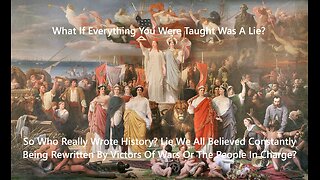 1:50:00
1:50:00
What If Everything You Were Taught Was A Lie?
23 days agoSo Who Really Wrote History? Lie We All Believed Constantly Being Rewritten By Victors Of Wars?
2.95K5 -
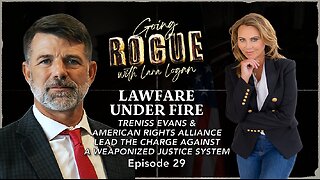 LIVE
LIVE
Lara Logan
12 hours agoLAWFARE UNDER FIRE: Treniss Evans Leading the Charge Against a Weaponized Justice System | Ep 29
240 watching -
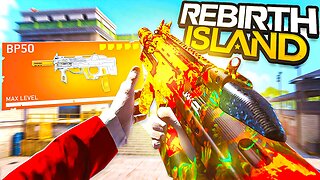 LIVE
LIVE
JuicyJohns
5 hours ago $2.40 earned🟢#1 REBIRTH PLAYER 10.2+ KD🟢$500 GIVEAWAY SATURDAY!
209 watching -
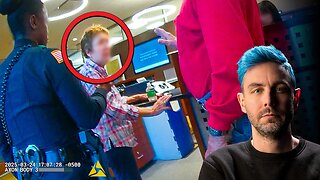 15:32
15:32
Scammer Payback
4 hours agoTormenting the Scammer Who Did This
7277 -
 17:28
17:28
IsaacButterfield
9 hours ago $0.13 earnedThe Government Just Banned Free Speech in the UK
8652 -
 2:01:46
2:01:46
Tim Pool
18 hours agoIs Trump Still Winning? | The Culture War LIVE Debate
151K163 -
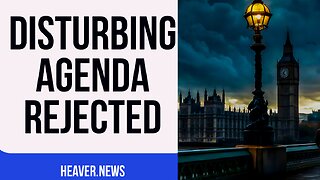 5:22
5:22
Michael Heaver
13 hours agoBritain's Enraged Voters Reject EXTREME Agenda
1.37K -
 LIVE
LIVE
Rebel News
1 hour agoNo trade deal for Carney, Christian cancelled in BC Bible Belt, Liberal bail reform | Rebel Roundup
400 watching -
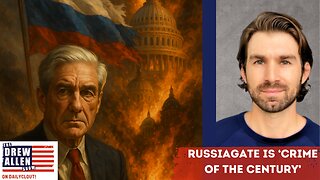 LIVE
LIVE
The Drew Allen Show on DailyClout
1 hour ago"Russiagate Is ‘Crime of the Century’"
96 watching -
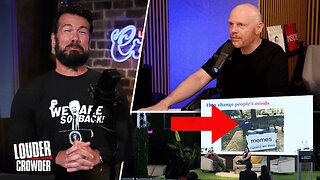 1:20:41
1:20:41
Steven Crowder
4 hours agoBill Burr Flames Out on Conservatives, Whites, and... Ben Shapiro
191K117